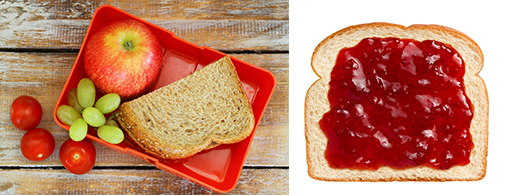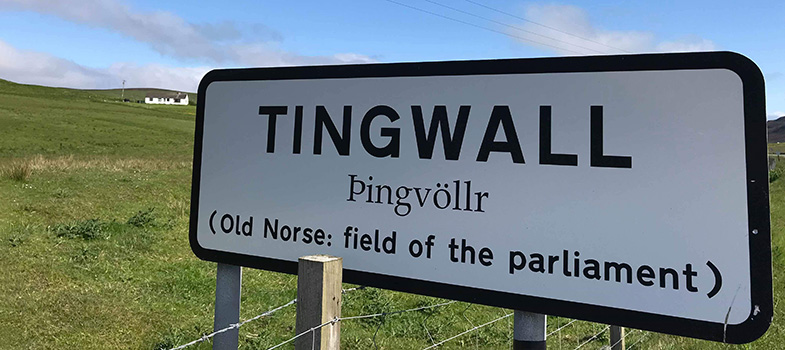6.3 Scran, piece and jeelie piece
In this section you will explore the use of three new Scots words for bread-related food.
- Scran: n. Food in general, especially in odd or miscellaneous pieces, provisions, “grub”; a schoolboy's term for sweet-meats, holiday or picnic provisions.
- Piece: a piece of bread and butter, jam, or the like, a snack, usually of bread, scone or oatcake, a sandwich.
- Jeelie piece: bread and jam; the most common kind of piece in Scotland, often provided as a snack between meals. By extension, a piece came to mean the sandwich lunch carried to work by the working man.

Activity 10
Part 1
If you research the term piece box in the urban dictionary [Tip: hold Ctrl and click a link to open it in a new tab. (Hide tip)] , you will come across this example:
Gaffer (Foreman): "Did ye bring a piece?"
New fella: "Aye, that's mah piece box there"
Practise your spoken Scots by speaking this short dialogue.
Transcript
Listen
Gaffer (Foreman): "Did ye bring a piece?"
New fella: "Aye, that's mah piece box there"
Model
Gaffer (Foreman): "Did ye bring a piece?"
New fella: "Aye, that's mah piece box there"
In parts of Glasgow, mothers would sometimes throw a piece out of the tenement window for a child to catch. When high rise flats were built to replace the 3-storey tenements in the 1950s, this became a little more challenging! The song writer Adam McNaughton produced his response to this in his ‘Jeelie piece sang’ in the 1960s.
Part 2
First of all, find out some more about the word piece for sandwich on the Scots word of the week section of Edinburgh’s Heriot-Watt University. You’ll find the words and translation of McNaughton’s famous song here as well.
Note the reference to bread in the chorus of the song. Here is a picture of Scottish pan bread.

There is no crust on the sides of plain loaves due to the unbaked loaves being stuck together in batches, baked together then torn into individual loaves afterwards; the pan loaf was baked individually in a tin. The pan loaf was more expensive than the plain so that the phrase pan-loaf came to be an adjective describing someone with a posh accent as this extract from Alan Sharp’s novel illustrates.
- ‘“Hello John” He had never quite accustomed himself to Mrs Davidson's voice. It had the classical range of refinements common to the west of Scotland, well-to-do matron, those vowel discolourations and arbitrary emphases known as the 'pan loaf', but instead of the effete bleat that usually accompanied it, with Mrs Davidson there was a hard vigorous timbre ...’
(Sharp, A., A Green Tree in Gedde, 1985)
6.2 Drink
